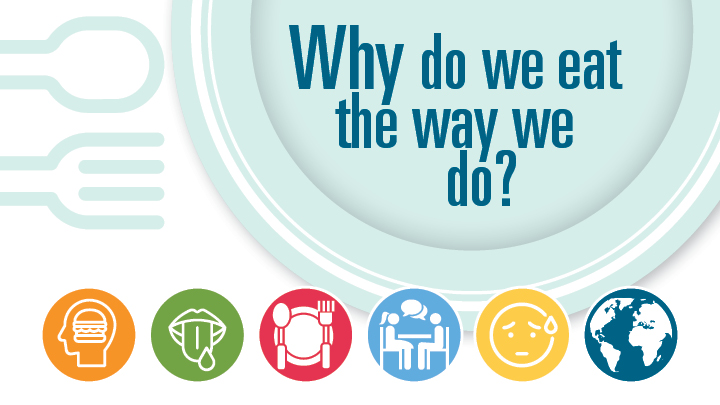Why Do We Eat the Way We Do?

You may not notice it, but there are several factors of influence that come into play when you’re making decisions everyday. Think about the last time you ate. Why did you eat it? Were you extra hungry? Where was the food from?
Understanding the different factors—personal and environmental—that influence our food choices will help you understand why we choose to eat certain foods.
Some factors that influence food choice:
1. Hunger
Our physiological needs form the base of our food choices. As humans, we need energy and nutrients to survive and will respond to the feelings of hunger and satiety.
2. Sensory Aspects
Taste is a major influence on food behaviour. Taste is the sum of all sensory stimulation that is produced by eating the food, including taste, smell, appearance and texture of food. Think of an apple for example—you may appreciate the sweet smell, the colourful and shiny appearance, or the crisp texture when you take a bite. These all contribute to the satisfaction you get from the food you eat.
3. Food Security
Food security is the state of having consistent access to sufficient and adequate food. Those who are food insecure due to financial limitations may skip meals or go entire days without eating. This is why the cost and accessibility of a food is major determinant when it comes to our food choices. The cost of food can contribute to poor health outcomes, by choosing the cheapest possible option available to them rather the more nutrient-dense option.
4. Cultural traditions
Our traditions are one of the strongest influences on our eating habits, including which foods we eat, how we prepare them, and which foods we don’t eat. For example, if you grew up in a household where you consumed less meat, this could influence you to consume less meat later on in life. The influence our family and culture when it comes to food is very prominent in our day to day lives. Especially in Canada, where we have access to so many cultural cuisines, it can be very enjoyable to try foods outside of what we are typically used to eating.
5. Social Context
Our attitudes and habits regarding food choices also develop through the interaction with others, especially our family. Growing up, dinner time was very important to me and family. That was the time where we all came together and shared how are days went and anything else that may have happened during the day. This gave me a chance to connect with my family and be more present when eating. Now, as I live away from my family, I try to do the same with my housemates when I eat. I try to eat at the same time with them on the same table, as it gives all of us a chance to connect and debrief about our days.
6. Psychological Factors
Psychological factors such as stress can create an influence on food intake, however this also depends on the individual, the stressor and the circumstances. In general, some people tend to eat more and some eat less than normal when experiencing stress. Especially during high stress times like exams, “stress eating” is very common, when we are feeling emotions such as boredom we may also turn to food and on the other hand when we’re in high spirits can also stimulate us to eat more. Ultimately, it is important to remember that food is not a reward nor a punishment, but more so something that fuels us!
By: Ilayda Ulgenalp
Food & Nutrition